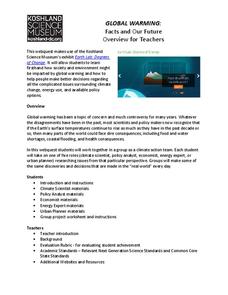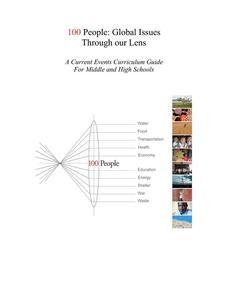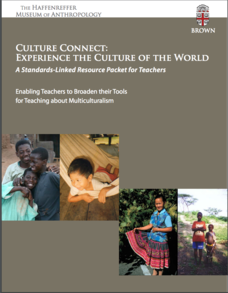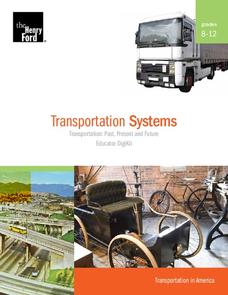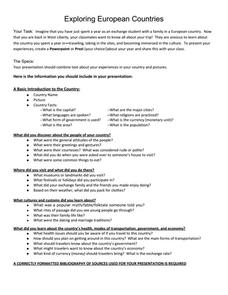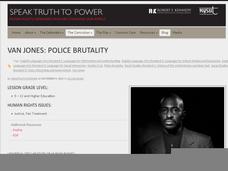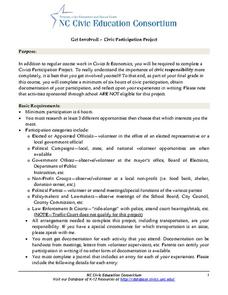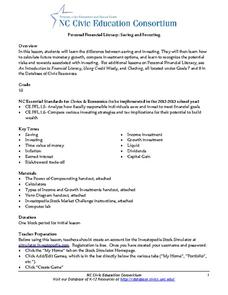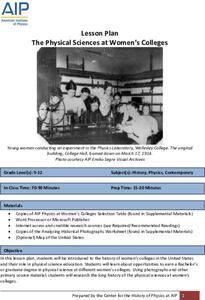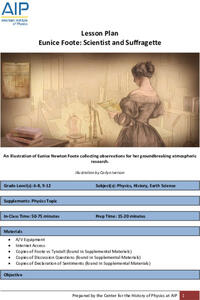Carolina K-12
Plessy v. Ferguson & the Roots of Segregation
How far in the past do the roots of Jim Crow and segregation extend? Young historians closely consider this question using detailed PowerPoint slides as a basis for discussion rather than lecture, culminating in an activity where class...
Echoes & Reflections
Jewish Resistance
Resistance to the Holocaust took on many forms. Learners explore the passive and active resistance of Jewish people who continued their practices and observances, as well as organized resistance against the evils of the Nazis. An...
Echoes & Reflections
The "Final Solution"
Nazi policies shifted from deportation and imprisonment to extermination of the Jewish people in death camps in the "Final Solution." Learners examine photos of artifacts, read poetry written by survivors, analyze testimony from...
Echoes & Reflections
Survivors and Liberators
The end was just the beginning. The period immediately after the end of World War II and the Holocaust is often called "The Return to Life" as survivors looked to reunite and recreate broken families and shattered lives. A two-lesson...
Echoes & Reflections
The Children and Legacies Beyond the Holocaust
Using video testimony, primary source documents that detail international agreements, and structured discussions, learners consider the precarious position of children during the Holocaust and other international conflicts, and how to...
Howard Hughes Medical Institute
Gorongosa: Making Observations Activity
Do you have young scientists wanting to make new discoveries rather than just completing the same experiments? Young scientists use their observational skills to identify animals and patterns in animal behavior. Through tracking...
National Academy of Sciences
Global Warming: Facts and Our Future
According to the United Nations, climate change affects every country on the planet. This research project encourages scholars to explore the factors that affect climate change from different perspectives: climate scientist, policy...
We are Teachers
What Goes Up Must Come Down
From understanding stock market performance and return on investment to identifying the costs and benefits of credit and avoiding debt problems, this is an absolute must-have resource for financial planning and literacy.
100 People Foundation
100 People: Global Issues Through Our Lens
If the world were 100 people...17 would not have access to safe drinking water, 18 would not be able to read or write, and 52 would not have a primary education. Using the theme of "100 people," this resource explores other major issues...
Brown University
Culture Connect: Experience the Culture of the World
A rich series of activities introduces learners to the concept of culture by closely examining the behaviors, practices, and art of three distinct peoples: the Highland Maya of Guatemala, the Hmong of China and Southeast...
Henry Ford Museum
Transportation Systems
Learners analyze the evolution of cultural attitudes through the lens of transportation, examining several artifacts, documents, and photographs. Topics covered include how American attitudes have influenced society's evolution into a...
West Liberty Community School District
Exploring European Countries
Your class members will each explore a European country of their choice and report back to the class using a creative PowerPoint or Prezi. They will not only include a basic introduction to the country, but also what they discovered...
Field Museum
The Case of Darwin's Finches
One of the most striking pieces of evidence for Darwin's Evolution of Species was his observations of finches and how their beaks differed from island to island, depending on their primary food sources. So what would happen to the theory...
Robert F. Kennedy Center for Justice and Human Rights
Van Jones: Police Brutality
Develop an understanding of how the media and society are connected and responsible for the defense of universal human rights. Learners investigate and examine the conflicts of police brutality as it is portrayed in the media and through...
National Endowment for the Humanities
Cultural Change
High schoolers research the passage of the 19th Amendment as an illustration of the mutual influence between political ideas and cultural attitudes. They also read the Seneca Falls Declaration and explore the cultural shifts it both...
Carolina K-12
Get Involved! - Civic Participation Project
What better way to learn about civic responsibility's importance than to experience it? From the opportunity to volunteer in an elected official's office and participate in a political campaign to observations of school board and city...
Center for Literacy and Disability Studies
GDP and Fiscal Policy Monopoly
Using the classic game of Monopoly and a revised set of rules in this resource, your class members will discover how GDP is calculated and practice enacting expansionary or contractionary fiscal policies. What a great way to learn about...
Carolina K-12
Loyalists and Patriots
Your young historians will square off as Loyalists dedicated to the English crown or revolutionaries fighting for a new nation in a role-play of a colonial town hall debate before the American Revolution.
Carolina K-12
Personal Financial Literacy: Saving and Investing
When should you save, and when should you invest? In considering this question, your class members will also learn about the time value of money, inflation, compounded interest, and income/growth investments. The resource also outlines...
American Institute of Physics
The Physical Sciences at Women's Colleges
After a brief introduction to the history of women's colleges in the United States and a discussion of the resistance such institutions faced, young scientists investigate seven traditionally women's colleges and their physics programs....
American Institute of Physics
Eunice Foote: Scientist and Suffragette
The greenhouse effect and climate change are hot topics in today's news. Young scientists may be surprised to learn that the concept is not a new one. In fact, Eunice Newton Foote, scientist, inventor, and suffragette, discovered the...
American Institute of Physics
The Physical Sciences at Historically Black Colleges and Universities
The history of science instruction at Historically Black Colleges and Universities (HBCUs) is the focus of a instructional activity that explores the early challenges these institutions faced in accessing equipment for their labs and...
American Institute of Physics
Historical Detective: Edward Alexander Bouchet and the Washington-Du Bois Debate over African-American Education
Young scientists meet Edward Alexander Bouchet who, in 1876, was the first African American to receive a PhD in Physics. This two-part lesson first looks at the debate between Booker T. Washington and W.E.B. Du Bois about the type of...
American Institute of Physics
African Americans in Astronomy and Astrophysics
A two-part instructional activity focuses on the contributions to the fields of astronomy and astrophysics of two African Americans: Benjamin Banneker and Dr. George Carruthers. In part one, scholars learn about Benjamin Banneker by...








